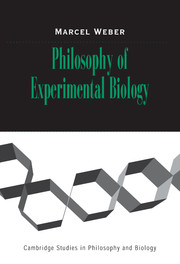Book contents
- Frontmatter
- Contents
- Preface
- Acknowledgements
- 1 Introduction
- 2 Reductionism and the Nature of Explanations
- 3 Discovery: Solving Biological Problems
- 4 Scientific Inference: Testing Hypotheses
- 5 Experimental Systems: A Life of Their Own?
- 6 Model Organisms: Of Flies and Elephants
- 7 Reference and Conceptual Change: Out of Mendel's Garden?
- 8 Developmental Biology and the Genetic Program: Explaining Ontogeny
- 9 Scientific Realism: In Search of the Truth
- Notes
- Bibliography
- Index
4 - Scientific Inference: Testing Hypotheses
Published online by Cambridge University Press: 08 July 2009
- Frontmatter
- Contents
- Preface
- Acknowledgements
- 1 Introduction
- 2 Reductionism and the Nature of Explanations
- 3 Discovery: Solving Biological Problems
- 4 Scientific Inference: Testing Hypotheses
- 5 Experimental Systems: A Life of Their Own?
- 6 Model Organisms: Of Flies and Elephants
- 7 Reference and Conceptual Change: Out of Mendel's Garden?
- 8 Developmental Biology and the Genetic Program: Explaining Ontogeny
- 9 Scientific Realism: In Search of the Truth
- Notes
- Bibliography
- Index
Summary
Under what conditions do experimental data or observations support a scientific hypothesis? Initially, philosophers sought the answer to this question in the relationship between theory and evidence. According to the hypothetico-deductive (H-D) account (Hempel 1945), empirical evidence supports or confirms a theory exactly if that evidence is logically entailed by the theory conjoined with additional assumptions, for example, about initial and boundary conditions or about the relationship between measurable quantities and theoretical magnitudes. The H-D account is plagued with various difficulties, which I am not going to review here (see Glymour 1980).
Clark Glymour has replaced the H-D account with an approach that came to be known as “bootstrapping.” According to this account, scientists are allowed to use a theory subject to test in analysis of data (as they often do). A test of a theory, then, consists in using the data and the theory to derive an instance of the laws that make up the theory. An instance is a statement that the various parameters and variables that feature in the theory take a definite value. The theory is confirmed by an instance if the instance satisfies the theory. Glymour's bootstrap theory is rich and interesting, but I have no idea how it could be applied to experimental biology. What would an “instance” of a theory describing, for example, some molecular mechanism be? It seems to me that the bootstrap theory is more germane to physics than to experimental biology.
- Type
- Chapter
- Information
- Philosophy of Experimental Biology , pp. 88 - 126Publisher: Cambridge University PressPrint publication year: 2004



